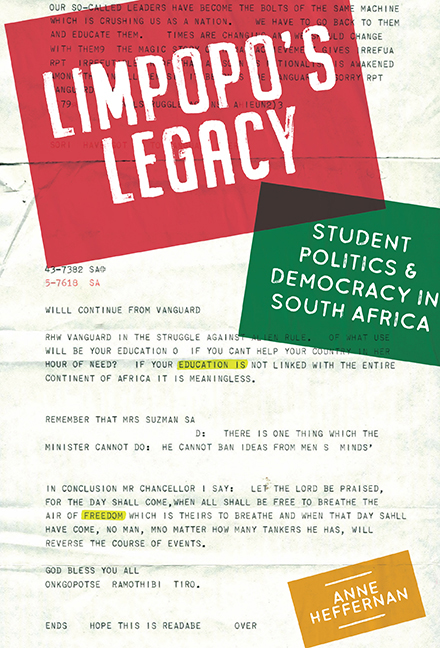Book contents
- Frontmatter
- Dedication
- Contents
- Acknowledgements
- Abbreviations and Acronyms
- Map of the north-eastern Bantustans showing the location of Limpopo
- Introduction
- 1 Turfloop, Crucible of Change
- 2 Centre of the Storm
- 3 Africanization: The New Face of Turfloop
- 4 Black Consciousness in Decline
- 5 Congresses and Comrades
- 6 Populism and the New Youth League
- 7 Julius Malema and Youth Politics in the New Limpopo
- Epilogue: Legacies of Limpopo
- Bibliography
- Index
Epilogue: Legacies of Limpopo
Published online by Cambridge University Press: 23 July 2019
- Frontmatter
- Dedication
- Contents
- Acknowledgements
- Abbreviations and Acronyms
- Map of the north-eastern Bantustans showing the location of Limpopo
- Introduction
- 1 Turfloop, Crucible of Change
- 2 Centre of the Storm
- 3 Africanization: The New Face of Turfloop
- 4 Black Consciousness in Decline
- 5 Congresses and Comrades
- 6 Populism and the New Youth League
- 7 Julius Malema and Youth Politics in the New Limpopo
- Epilogue: Legacies of Limpopo
- Bibliography
- Index
Summary
The introduction to this book opened in the present, on the scenes of student protests at Turfloop in 2016 when the campus joined nationwide student strikes as part of the FeesMustFall Movement that had been sparked on other campuses. But the body of the text has argued that Turfloop – and Limpopo as a whole – has a much deeper history of student protest, and youth-driven change. In fact, even FeesMustFall had earlier precedents at Turfloop and its fellow former ‘bush’ colleges; students on these campuses led calls for the institution and improvement of aid schemes like the National Student Financial Aid Scheme (NSFAS) in the 1990s and early 2000s. As one protesting student told researcher Musawenkosi Malabela,
There were countless protests, countless shut downs and countless efforts but were not given the same space like what you call #FeesMustFall movement, which is given attention by the media. You can't dissociate the fact that there used to be TEFSA [Tertiary Education Fund for South Africa] now there is NSFAS and now you even have the NSFAS saying that final [year] students who have passed their entire course, their loan must be changed into a bursary. These are victories of relentless struggles and violent protests that have been waged by students and generations of student leaders at Turloop and other black universities.
Turfloop, then, has remained an important site of ideological and political formation, even as it has faded from the front pages of South Africa's papers. But as in the 1960s and 1970s, students on this perirural campus are raising some of the key political issues of their time, often before their national counterparts do so. I have tried to argue here for its crucial place – and for the place of Limpopo as a whole – in the historiography of South African struggle.
Who is remembered? Associational legacies in Limpopo
This book has chronicled three major periods in the history of student and youth activism in the Northern Transvaal over the latter decades of the twentieth century: from the relatively elite-led, university-oriented ideological protest of the Black Consciousness movement, to the locally rooted regional expansion of protest politics under COSAS and youth congresses, to the congregation of those once-disparate groups under the banner of the unbanned ANC Youth League.
- Type
- Chapter
- Information
- Limpopo's LegacyStudent Politics & Democracy in South Africa, pp. 223 - 230Publisher: Boydell & BrewerPrint publication year: 2019



